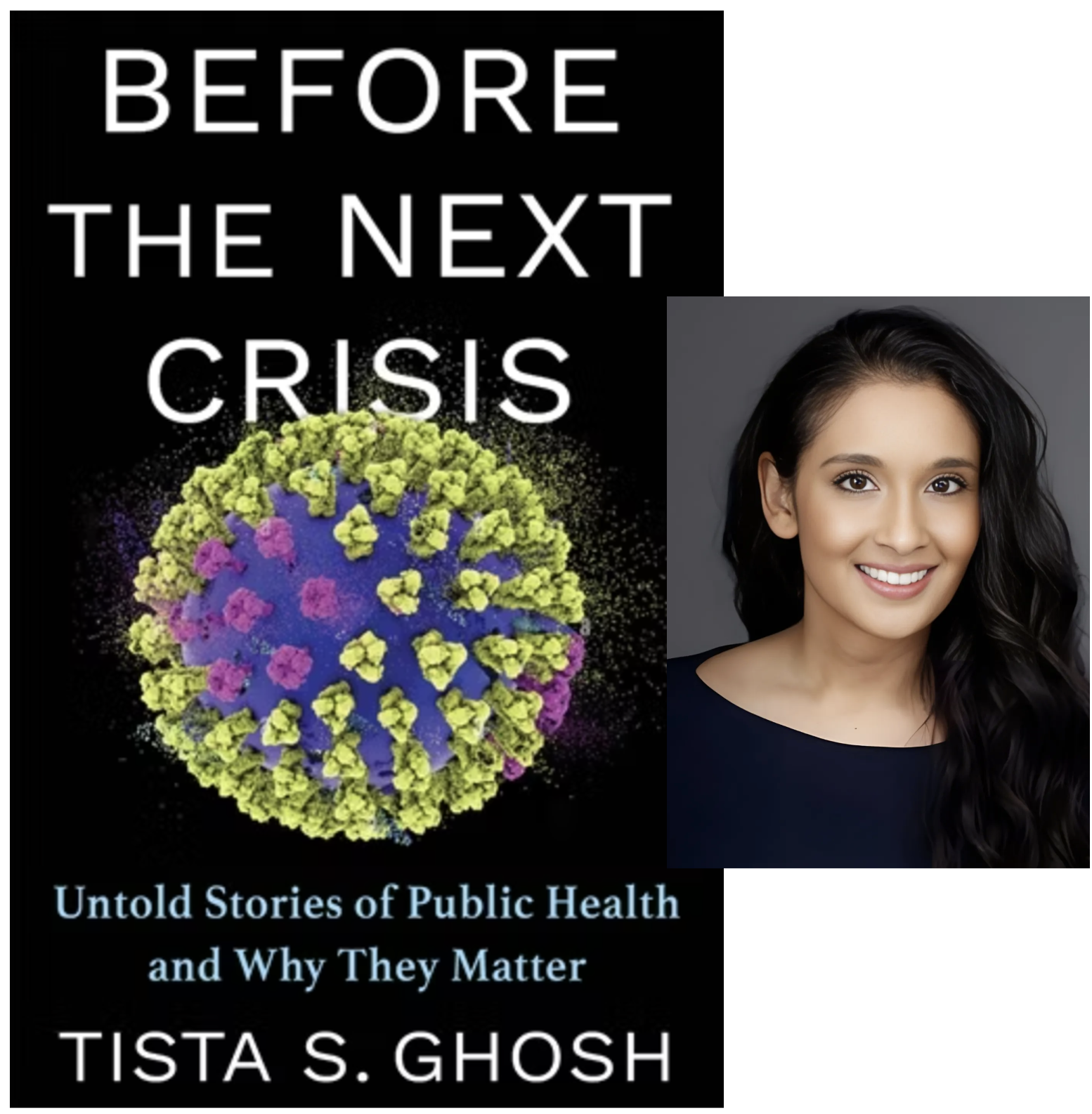Before the Next Crisis: Untold Stories of Public Health and Why They Matter (Columbia University Press, 2025) is Tista S. Ghosh’s urgent wake-up call to a country already drifting into pandemic amnesia. Drawing on her experience as a CDC-trained epidemiologist and health journalist, Ghosh examines how decades of societal neglect and public misunderstanding of public health shaped the U.S. response. Ghosh, the chief medical officer for the state of Colorado, includes the voices of those who lived the COVID-19 crisis from the front lines and the ways in which the distortion of science through partisan lenses contributed to the mishandling of the pandemic.
She warns that these same forces will shape the next crisis.
If, as the public health maxim says, “an ounce of prevention is worth a pound of cure,” Ghosh asks why we keep ignoring the ounce—and what it costs us when we do. She interweaves her career path with stories from essential workers, healthcare providers, community leaders, and local public health staff. Their accounts—some quiet, others raw—reveal the paradox at the heart of public health: it succeeds when nothing happens, yet is most visible in failure. In 2019, the U.S. ranked first in global pandemic preparedness; a year later, it led the developed world in COVID deaths. Ghosh diagnoses the underlying conditions: chronic underfunding, confusion between healthcare and public health, and a cultural ethos that prizes individual rights over collective responsibility.
The book’s tone is one of narrative humility—no grandiose self-portrait, no claims of singular heroism. Instead, the power lies in relaying stories of lived experiences.
Liane, a public health executive from Colorado, recalls the shifting community mood in late 2020:
So around Thanksgiving of 2020 is when it started to feel like we, in local public health, were the enemy. We, by virtue of the jobs that we had, were the people telling you, you couldn’t have Thanksgiving. There’d be no Christmas this year. You couldn’t visit your friends and family that you hadn’t seen potentially in months. We were disrupting kids’ education. We were disrupting college kids’ experiences. So prior to that I feel like we were seen more as heroes, bravely trying to unravel and translate the changing and confusing messages coming from CDC or the state. But suddenly, around that Thanksgiving period, the community vibe shifted to “kill the messenger.’’
Ghosh shows why stories like this matter. During Colorado’s 2018–2019 measles outbreak, she was trying to warn policymakers in Colorado that although the state had the lowest measles vaccination rates in the country, Colorado was still at risk for a measles outbreak. But information failed to move legislators. “My statistics and facts barely received any attention. One legislator said something like ‘What’s the big deal with measles anyway? It’s just a rash, right?’” Unplanned, she then shared a personal story about her medically fragile infant son, too young for vaccination and at grave risk. The emotional truth reached them where data had not, illustrating how a single human narrative can cut through indifference.
She is equally clear-eyed about the politicization of pandemic discourse. On the right, public health measures such as masking and vaccination were cast as government overreach; on the left, restrictions sometimes became moral litmus tests, with dissent treated as denialism. Both eroded trust in science, turning evidence into partisan ammunition. This raises the central question: Who controls the pandemic narrative—the scientists who understand the data, the clinicians who treat the patients, or the politicians who wield the power to act?
Through these stories, Ghosh presents uncomfortable but necessary questions: How do we prepare for the next pandemic when the last one is already fading from memory? How do we bridge the gap between data and lived experience? And most urgently—how do we rebuild trust before the next test comes?
Her rhetorical strategy is deliberate: establish credibility through expertise, create urgency through personal and community narratives, and reinforce arguments with data and history. The result is a book that distinguishes public health from healthcare, challenges the dominance of individualism over collective welfare, and translates policy debates into human stakes. This is more than a policy book. Its lessons are plain: Prevention is not the enemy of freedom; trust is as important as technology; remembering is itself a public health act. We now carry the burdensome gift of knowing another pandemic will come. In forgetting, we refuse to prepare. Before the Next Crisis offers a way to remember—guided by those who bring us true insight, having deeply experienced and reflected on the last pandemic.—Tony Errichetti
Tony Errichetti
Tony Errichetti, PhD, MA is a 2021 graduate of Columbia University’s Certificate of Professional Achievement in Narrative Medicine. He currently serves as Director of Programming at Narrative Mindworks. In addition, he is a thesis advisor for the M.S. in Healthcare Simulation program at the New York Institute of Technology College of Osteopathic Medicine, a consultant on doctor–patient communication assessment for the National Board of Osteopathic Medical Examiners, and an adjunct instructor at Pace University’s English Language Institute in New York City. Errichetti’s writing includes book reviews for Intima: A Journal of Narrative Medicine, notably Beautiful Trauma by Rebecca Fogg (April 4, 2023) and Ordinary Deaths: Stories From Memory by Samuel LeBaron (October 24, 2022). Find him on LinkedIn


